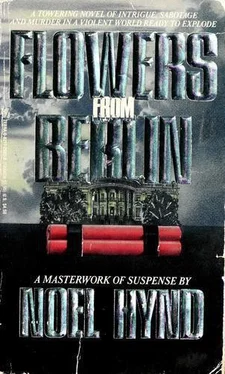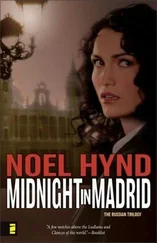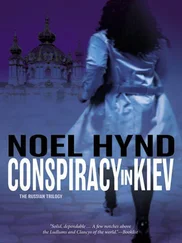Noel Hynd - Flowers From Berlin
Здесь есть возможность читать онлайн «Noel Hynd - Flowers From Berlin» весь текст электронной книги совершенно бесплатно (целиком полную версию без сокращений). В некоторых случаях можно слушать аудио, скачать через торрент в формате fb2 и присутствует краткое содержание. Жанр: Политический детектив, на английском языке. Описание произведения, (предисловие) а так же отзывы посетителей доступны на портале библиотеки ЛибКат.
- Название:Flowers From Berlin
- Автор:
- Жанр:
- Год:неизвестен
- ISBN:нет данных
- Рейтинг книги:3 / 5. Голосов: 1
-
Избранное:Добавить в избранное
- Отзывы:
-
Ваша оценка:
- 60
- 1
- 2
- 3
- 4
- 5
Flowers From Berlin: краткое содержание, описание и аннотация
Предлагаем к чтению аннотацию, описание, краткое содержание или предисловие (зависит от того, что написал сам автор книги «Flowers From Berlin»). Если вы не нашли необходимую информацию о книге — напишите в комментариях, мы постараемся отыскать её.
Flowers From Berlin — читать онлайн бесплатно полную книгу (весь текст) целиком
Ниже представлен текст книги, разбитый по страницам. Система сохранения места последней прочитанной страницы, позволяет с удобством читать онлайн бесплатно книгу «Flowers From Berlin», без необходимости каждый раз заново искать на чём Вы остановились. Поставьте закладку, и сможете в любой момент перейти на страницу, на которой закончили чтение.
Интервал:
Закладка:
But Hunsicker was also a courier who brought with him an urgent message from the Gestapo. Siegfried was no longer to use the old route for messages-the diplomatic dispatch route through the Portuguese Consulate in New York, via Lisbon to Berlin.
"Instead," said Hunsicker in German, reciting without curiosity the message he had memorized in Genoa, "you are to begin radio communication directly with the Third Reich at 1900 hours, Eastern Standard Time, July 15. By that time you will have your receiving set ready. You will listen for the call letters assigned to you."
Hunsicker opened his wallet. He handed Siegfried a coded scramble of letters which had been handwritten on the back of a baggage receipt from the ship. From these letters Siegfried broke down the code and determined the call letters that German intelligence, the Abwehr, had assigned to Siegfried's radio set-- CQDXVW-2. Siegfried would be communicating with radio station AOR-3 in Hamburg.
Siegfried showed no emotion whatsoever. "It's about time," he finally answered. "When you get back to the Reich, Wilhelm, you can ask those incompetents in the Gestapo what took them so long."
Hunsicker was surprised at the reproach. His eyes skipped to Duquaine. But Siegfried held his attention. "Now," Siegfried said, "you have something else for me, don't you?"
Hunsicker nodded, then handed Siegfried a small green envelope, the type a jeweller might use. Siegfried pocketed it.
A tall, spare man with a cadaverous face, Duquaine stood to one side and watched the transaction. A skilled spymaster, the graying Duquaine had been in the employ of Germany since 1913. Unlike the other two men in the room, he was a Boer, born in the Transvaal in 1890. He harbored a deep hatred for England and America, the two Anglo-Saxon superpowers, and if pressed would explain his passion by citing atrocities inflicted upon his parents by the British Army. He stood near the apartment's fireplace and watched Siegfried finish a cherry brandy. Despite his decades of experience, Duquaine was still perplexed by Siegfried. The man was an enigma.
"There is nothing else, is there?" Siegfried asked the courier, who was strangely silent.
"No," answered Hunsicker, suddenly ill at ease.
"Then Herr Duquaine and I wish to speak privately." Siegfried's eyes indicated the door.
Hunsicker wavered for a moment. His eyes flirted expectantly with the bottle of brandy. Then Duquaine interceded.
"Thank you, Wilhelm," Duquaine said. "I will see you tomorrow when we sail."
The huge man glowered for a moment at Siegfried, retrieved his hat, and departed. Siegfried reached for a paper bag beside his chair. "Now I have something for you," he said to Duquaine.
He produced a German-language version of the Holy Bible, an edition old enough to have been printed in the last century, which made it several years older than Siegfried. Siegfried thumbed the book a final time, ran his fingers across the binding, then flicked it closed. The book was ornate and looked like a family heirloom.
"My gift for those in Hamburg and Berlin," Siegfried announced. He handed the Bible to Duquaine, who accepted, it. "How long is The Panama 's voyage to Europe?”
"Seven days."
Duquaine poured himself a brandy and angled the conversation in a different direction. "You're capable of building this transmitter yourself?"
"I've been ready for several years," Siegfried said. He glanced at his watch, then raised his eyes to Duquaine again. "You know," Siegfried added, "I can win their whole war for them if only Berlin will let me. You'll tell them that, too."
It was more of a statement than a request.
"I will stress your enthusiasm."
Siegfried gave Duquaine a mildly contemptuous look and again changed the subject.
"Your ship sails at eight in the evening?"
"Yes."
"You'll be wise to be on it. Your organizations here are filled with traitors and amateurs. It's a wonder any information of any value at all gets back to Berlin. Even through the channels of the Gestapo itself."
Siegfried fingered the bottle of brandy, then decided against any more. "If the Lisbon route is compromised, my dear Duquaine,” he said, “it's a matter of time before you are, too."
Duquaine pursed his lips and gazed at the younger man. Walking the streets or going to a movie was exactly what he had planned for the next day, for exactly the reason cited. In three decades of intelligence work on three different continents, he had never seen anything quite the equal of this thirtyish, dark-haired man. Siegfried was brilliant, but excessive beyond words.
"Which leads us to this," edged Duquaine. "Berlin insists on a system of contact."
"Of course." Siegfried allowed a silence.
"You have devised one?"
"When you return to America," said Siegfried, "you will go to Battery Park, across from the Statue of Liberty. You will go on Tuesdays and Fridays and appear in front of the Sailor's Monument at noon, when the park is most crowded. You will carry an umbrella and an attache case in your left arm. In your other hand you will have a New York Journal-American, folded. You will then go to a bench at the south end of the park and sit for fifteen minutes. Watch the ships in the harbor. If I care to contact you that day, I will find you as you leave the park. For what I am doing, I must be certain that there is no surveillance."
"And I notice that there is no way you wish us to contact you?"
"I can be contacted by radio. From Germany. By the High Command only."
"And this sitting in the park, these orders you are giving me.. . what if it rains?"
Siegfried stood and reached for his own coat and hat. "You're supposed to be brilliant, also, Herr Duquaine. If it rains, use your umbrella."
Duquaine watched Siegfried pull on the overcoat and depart. Duquaine was enough of a professional himself to genuinely understand the danger-and the value-of such a man. Siegfried worked alone, with no immediate allies. He was impossible to control; orders could be issued only as requests. Duquaine wondered if Siegfried could even control himself.
Duquaine, in fact, had been in the espionage game long enough to reduce certain aspects of it to a science. The first thing he wanted to know about a man was his motivation. Why did a man become a spy?
He could answer that question about himself. Hatred of the Anglo-Saxon world. He could answer it about most of the men he had encountered over his lifetime. Political zeal. The sense of danger. Anger. Vengeance. Money. Sex. Every man had his motivation. Yet with Siegfried, motivation was invisible. Siegfried, Duquaine had decided one rainy evening long ago, was pursued by certain inner demons. And only heaven and hell knew what they were.
It was well after midnight, but not yet 1 A.M., as Siegfried walked down the three flights of Duquaine's tenement. He paused in the doorway and scanned the street. He lit a Pall Mall and began to walk.
A few restaurants were still open in Yorkville, but the last patrons were starting to emerge. The kitchen staffs and dining-room employees were starting home. A handful of bars remained open, though none were crowded. Much of the joy of the German-American beer halls had disappeared over the last few years. The mood was more somber, even occasionally tense. Some had taken Swiss names as the international situation grew cloudier. The Bremen had changed its name earlier in the year to the Zurich. And the Munchen Bar, the fixture at the northwest corner of Eighty-ninth and Second Avenue, was now the Fondue Chalet. Why, Siegfried wondered, did not anyone in America understand the wonderful things that Adolf Hitler was accomplishing on behalf of the German people? Why did the American press spread such insidious lies about the Fuehrer's national socialism?
Читать дальшеИнтервал:
Закладка:
Похожие книги на «Flowers From Berlin»
Представляем Вашему вниманию похожие книги на «Flowers From Berlin» списком для выбора. Мы отобрали схожую по названию и смыслу литературу в надежде предоставить читателям больше вариантов отыскать новые, интересные, ещё непрочитанные произведения.
Обсуждение, отзывы о книге «Flowers From Berlin» и просто собственные мнения читателей. Оставьте ваши комментарии, напишите, что Вы думаете о произведении, его смысле или главных героях. Укажите что конкретно понравилось, а что нет, и почему Вы так считаете.












